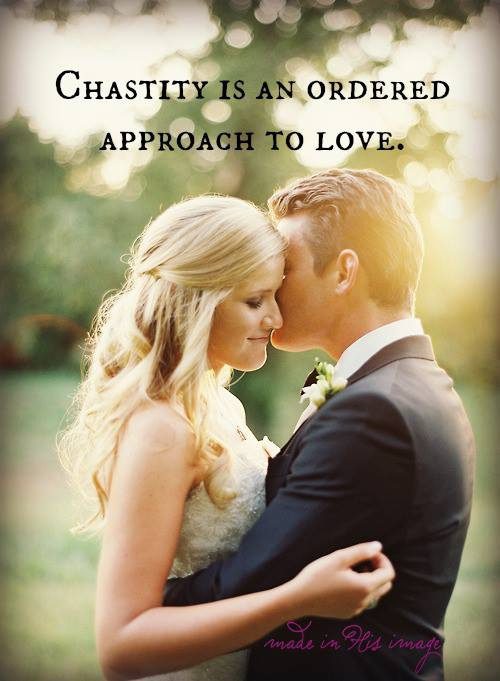The Importance of Emotional Chastity in the Dating Process
In my first article, Dating with Purpose, I provided the big picture of how youth, with the assistance of their parents, can navigate the rough waters of relationships and approach them with maturity and purpose. This article delves deeper into how to interact with other people in appropriate ways. We all have a desire to be loved. In pursuit of that love, we are tempted to give ourselves away and surrender to another so as to have our physical or emotional need for love satisfied. This can be done in two ways. One is by surrendering your physical self, which we hear about often, and the other is by surrendering our emotional self.
 Articles on physical chastity are many and they are worthwhile, but in my opinion, they are focused on addressing what happens when emotional chastity is not exercised. Sarah Swafford posits that guys are tempted toward violations of physical chastity, while females primarily contend with maintaining emotional chastity. Both can lead towards sexual sin, but it is important to understand how men and women differ in where this path begins. All too often, men are unaware of the roller coaster of emotions that his affections towards a girl will send her on. The constant games played in relationships leaves everyone guessing what one’s intentions are. I have found that many times my own children have difficulty reading the intentions of an interested party and it is often because the young person doesn’t know himself why he is acting in a certain way. It is so easy to lead with our emotions instead of our heads and it leads us down a path we might not be ready to go. It is very important for men and women to understand what is appropriate conversation and contact. Speaking clearly and honestly in a relationship can often spare many heartaches.
Articles on physical chastity are many and they are worthwhile, but in my opinion, they are focused on addressing what happens when emotional chastity is not exercised. Sarah Swafford posits that guys are tempted toward violations of physical chastity, while females primarily contend with maintaining emotional chastity. Both can lead towards sexual sin, but it is important to understand how men and women differ in where this path begins. All too often, men are unaware of the roller coaster of emotions that his affections towards a girl will send her on. The constant games played in relationships leaves everyone guessing what one’s intentions are. I have found that many times my own children have difficulty reading the intentions of an interested party and it is often because the young person doesn’t know himself why he is acting in a certain way. It is so easy to lead with our emotions instead of our heads and it leads us down a path we might not be ready to go. It is very important for men and women to understand what is appropriate conversation and contact. Speaking clearly and honestly in a relationship can often spare many heartaches.I have found that preparing a relationship for a friendship and leaving the romance out completely or at least to a minimum during this beginning friendship stage is very important. Often when relationships begin with the romance, the friendship is never able to develop and couples find themselves with people they don’t really know. So what does a chaste friendship look like? Well first, one has to limit the amount of contact to allow the relationship to have time to grow. Starting out a friendship with someone by spending part of everyday together would clearly promote an emotional attachment. If a young person is not sure how much time is appropriate, they should talk to a trusted adult, like their parents. In fact, a key to developing mature relationships with the opposite gender is having a great parent/teen relationship. Children learn much about what a healthy relationship looks like by the example that adults within their lives provide for them. If they see constant arguing, bickering, back stabbing, and gossip, then they will probably mimic these poor interpersonal relationship traits. Parents are always teaching their children especially through their actions. Mature relationships are built on healthy friendships and sometimes these trusting friendships blossom into marriage.
Practical Advice
 This article seeks to suggest practical tools for guarding one’s heart. Don’t spend hours and hours texting every day. Remember, this is just a friend, someone that you have something in common with and so limit your conversations to planning an outing with friends, talking about something relevant to your shared interests such as band, youth group, or a sports activity. The more you talk about nothing, the more likely you are to share too much too soon and turn a good friendship into something more when neither of you are ready to take it to that next step (see the recommendations for when to start dating in my previous article). What I tell my kids and their friends is that if they want to ensure that they will never be married in the future to each other, then become more than friends now. Because that relationship will have no where to progress to other than temptation. Thus, they will only end up with hurt feelings because you can only hold hands and kiss for so long before you lust for more intimacy. Romantic relationships can only be satisfied for so long, whereas friendships can be maintained for a lifetime or at least until you are both ready to seek out your lifelong helpmate.
This article seeks to suggest practical tools for guarding one’s heart. Don’t spend hours and hours texting every day. Remember, this is just a friend, someone that you have something in common with and so limit your conversations to planning an outing with friends, talking about something relevant to your shared interests such as band, youth group, or a sports activity. The more you talk about nothing, the more likely you are to share too much too soon and turn a good friendship into something more when neither of you are ready to take it to that next step (see the recommendations for when to start dating in my previous article). What I tell my kids and their friends is that if they want to ensure that they will never be married in the future to each other, then become more than friends now. Because that relationship will have no where to progress to other than temptation. Thus, they will only end up with hurt feelings because you can only hold hands and kiss for so long before you lust for more intimacy. Romantic relationships can only be satisfied for so long, whereas friendships can be maintained for a lifetime or at least until you are both ready to seek out your lifelong helpmate.If you become romantically drawn to a friend, don’t share it with them or your friends right away. This usually leads to gossip about how “She likes him. Does he like her? Have they told each other?” and this makes friendship difficult to maintain. Relationship gossip to teenagers is like a kid in a candy store. They’ll eat it up and consume all of their time with “Who likes who?” In one of my daughter’s friend’s experience, conversations about teen romance are circular, leading nowhere except down a hill of fantasy and illusion. My daughter Ellen has had her share of dealing with emotional chastity in her relationships and has experienced what it is like when relationships are not kept emotionally chaste. She says, “Even though emotional chastity can often times be harder to maintain then physical chastity, it is so important! I made the mistake of becoming emotionally attached too fast in a previous relationship and now it is harder for me and this guy to be just friends anymore.” Emotional chastity is not just a stuffy old fashioned idea that doesn’t relate to society anymore. It is something that should be practiced in all relationships, even ones that may not lead up to marriage.
 Dating with Purpose is a process, one that shouldn’t be rushed lest we give away something that we should be saving for our spouse and to be honest, we just don’t know who God has prepared for us until we go through the process of finding a friends whom we are attracted to and is attracted to us, entering into a discernment of marriage and ultimately exchanging vows before God and our friends and family. The relationship with our spouse is designed to be one of a kind, second only to our relationship with God, that is how special it is. Scripture points to its beauty by speaking of how the two become one within the first chapters of the Bible. While physical and emotional chastity are both difficult to maintain, the beauty of that gift being brought to the marriage is worth it.
Dating with Purpose is a process, one that shouldn’t be rushed lest we give away something that we should be saving for our spouse and to be honest, we just don’t know who God has prepared for us until we go through the process of finding a friends whom we are attracted to and is attracted to us, entering into a discernment of marriage and ultimately exchanging vows before God and our friends and family. The relationship with our spouse is designed to be one of a kind, second only to our relationship with God, that is how special it is. Scripture points to its beauty by speaking of how the two become one within the first chapters of the Bible. While physical and emotional chastity are both difficult to maintain, the beauty of that gift being brought to the marriage is worth it.